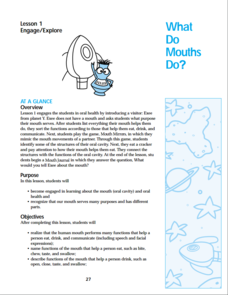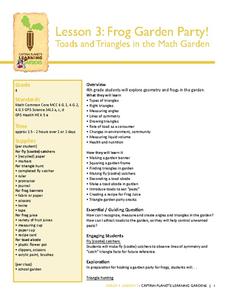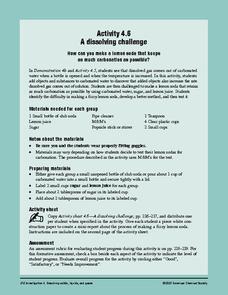Curated OER
Making Regolith
You may not be able to take a field trip to the moon, but that doesn't mean your class can't study moon rocks. Using graham crackers as the moon's bedrock and powdered donuts as micrometeorites, young scientists simulate the creation of...
Curated OER
Get a Leg Up
Traveling through space is an amazing experience, but it definitely takes a toll on the body. After reading an article and watching a brief video, learners perform an experiment that simulates the effects of zero gravity on the human body.
Colorado Unit Writing Project
Simple Machines
Planning an elementary science unit has never been simpler! These twelve lessons guide young scientists through an exploration of simple machines and their many uses in the real world before asking them to apply their learning in the...
STEM for Teachers
Tsunami!
How does the depth of an ocean affect the speed of a tsunami's waves? Use Jell-o, graham crackers, and marshmallows to model the effects of an underwater earthquake and its resulting tsunami. The instructional activity includes hands-on...
Cal Recycle
Conserving Natural Resources
Trying to plan an engaging elementary science unit on natural resources? Conserve your energy! This five-part series of lessons and hands-on activities has exactly what you need to teach young scholars about the importance of conservation.
NASA
The Science of the Sun
There's more to that glowing ball of light in sky than most children realize. From the overall structure of the solar system, to the changing of the seasons, these hands-on lessons open the eyes of young scientists to the important role...
VCEC
Exploring Homophones
What do homophones and levers have in common? They're part of a design challenge that asks primary graders to create a display that connects two homophones and has at least one part that is moved by a lever. A knight that raises his...
Government of South Australia
Don't Waste Your Energy
Don't lift another finger, this physical and environmental science unit has everything you need to begin teaching your class about energy. Starting with a look at the greenhouse effect, these lessons and activities take young scientists...
State of Victoria
Making Healthy Choices, Making Healthy Food: PreK-3 Curriculum Support
From examining how much sugar is in foods and looking at fruit and vegetable varieties to making mini rainbow tarts, this unit provides youngsters with a fabulous overview of proper nutrition and eating habits.
State of Victoria
Making Healthy Choices, Making Healthy Food: 4-6 Curriculum Support
How much water should we drink every day? How can food preparation be both healthy and satisfying? Check out this great 10-lesson unit which not only covers the body's need for water, but also includes lessons on tasting and storing...
National Institutes of Health
Open Wide and Trek Inside
Don't underestimate the value of a clean mouth! Here is a six-lesson unit that details everything a youngster needs to know about oral hygiene. It includes lessons on the purpose of a mouth and teeth, the nature of oral bacteria and the...
Sea World
Shark!
Is that a shark? Here's a 10-lesson unit that will have learners expanding their definition of what a shark actually is as they examine different features, habitats, and diets. They explore endangered species, using information cards...
Agriculture in the Classroom
Chocolate Taste-Testing: Introduction to Loco for Cocoa
Is the price of chocolate a good indicator of taste? Your learners will approach this question through experimentation and analysis, and will then delve into the rich history and complexity of cacao and chocolate.
Captain Planet Foundation
Frog Garden Party! Toads and Triangles in the Math Garden
It's frog party time! With frog banners, frog juice, and a triangle hunt, your garden party is sure to be both entertaining and educational. The lesson plan connects geometry, earth science, and delicious snacks to teach kids about...
Captain Planet Foundation
Energy Flow in the Garden
How can you tell what an owl has eaten? Study the food chain and flow of energy in an ecosystem by dissecting an owl pellet and noting the bones found inside. Additionally, the instructional activity includes a game about consumers and...
Captain Planet Foundation
Worm Your Way Out of This
How can you provide healthy soil for your garden? Study worms, bacteria, and other microorganisms in a lesson about decomposition and organic compost. After discussing what you know about worms and watching a video, watch what worms do...
Captain Planet Foundation
Solar Cooking Race
Study heat transfer with activities that focus on how heat energy works. Using a solar cooker, ice cubes, and heat transfer bracelets, kids experiment and record what they find by keeping ice cubes cold and vegetables hot.
NASA
Soda Straw Rockets
Three, two, one, blast off to a better understanding of force and motion with this exciting science lesson! Beginning with a discussion about rockets and gravity, young scientists go on to complete a series of worksheets about net forces...
American Chemical Society
A Dissolving Challenge
After collecting carbon dioxide bubbles from a cup of club soda, learners attempt to make their own lemon soda while preventing the loss of carbonation. They do so by creating a syrup before mixing the substances into the club soda....
American Chemical Society
Formation of a Precipitate
Conclude this chemical change unit by having your class combine two liquids that result in formation of a precipitate. The learners discover that chemical reactions result in new materials. Make sure to consider all of the preceding...
American Chemical Society
Comparing the Amount of Acid in Different Solutions
Upcoming chemists use chemical reactions to determine relative pH in two different acids. This is a terrific instructional activity for middle schoolers that can stand alone as a practice in precision and lab skills, or as part of the...
American Chemical Society
Color Changes with Acids and Bases
Getting back to the beginning of the unit, learners use reactions with red cabbage juice to determine if solutions are acidic, neutral, or basic. This is a straightforward and classic investigation, but what you will appreciate is the...
American Chemical Society
Change in Temperature - Exothermic Reaction
Alone, or as part of the intended unit on chemical reactions, this activity allows learners to experience an exothermic reaction. Here, learners add calcium chloride to a baking soda solution and watch the temperature rise! They will...
American Chemical Society
Production of a Gas - Controlling a Chemical Reaction
Though the publisher designated this unit for use with third through eighth grades, this particular lesson would be best used with middle schoolers due to the specific measurement skills required. Basically, they set up the reaction...

























